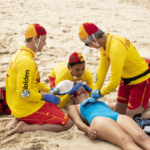
Author: Marcy Burnham, RN
Military families make countless sacrifices, and among them, military children endure unique challenges. From frequent relocations to prolonged separations from parents, these young individuals exhibit resilience and adaptability beyond their years. As we honor and support military children, it is equally vital to educate families about first aid and cardiac health—two essential components of their well-being.
April is designated as the Month of the Military Child, a time to recognize the strength and resilience of these young heroes. Military children often move every two to three years, changing schools, making new friends, and adapting to different environments. While they develop remarkable coping skills, these transitions can take a toll on their emotional and physical health. Stress, anxiety, and disruptions in medical care are common concerns for these children.
Due to frequent relocations and deployments, military children may experience situations where immediate first aid knowledge can be lifesaving. Whether they are at home, in a new school, or on base, having a basic understanding of first aid can make a significant difference.
Key First Aid Skills for Military Families:
CPR Training: Knowing how to perform cardiopulmonary resuscitation (CPR) can save a life during emergencies like drowning or cardiac arrest.
Wound Care: Understanding how to clean and dress wounds can prevent infections, especially in new environments where medical facilities may not be immediately accessible.
Choking Relief: Young children are particularly at risk, making it essential for parents and older siblings to learn how to assist someone choking.
Recognizing Signs of Medical Emergencies: Training children and parents to identify symptoms of heat exhaustion, dehydration, or allergic reactions can prevent severe health issues.
Ways to Promote Cardiac Health:
Encouraging Regular Exercise: Engaging in outdoor activities, team sports, or even simple family workouts can help maintain cardiovascular health.
Healthy Eating Habits: Frequent moves may lead to inconsistent diets. Prioritizing balanced meals with fruits, vegetables, and lean proteins can improve heart health.
Managing Stress: Helping children cope with stress through mindfulness techniques, counseling, and open conversations can reduce the risk of stress-related heart problems.
Regular Health Check-ups: Military families should ensure children receive consistent medical evaluations, including screenings for blood pressure and heart conditions.
Military children display unwavering strength, but they also need a strong support system. By spreading awareness about first aid and cardiac health, we can empower these young heroes and their families with the tools necessary to thrive. Investing in their well-being today ensures they grow into healthy, resilient adults who carry forward the legacy of service and sacrifice.
Office: (205) 417-4711
Email: info@aed365.com






